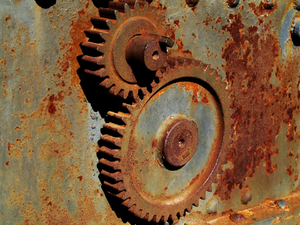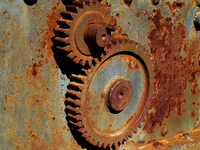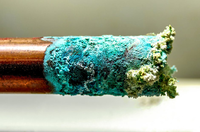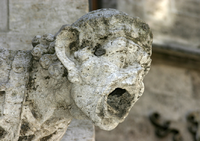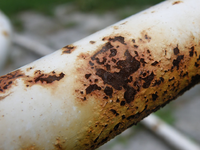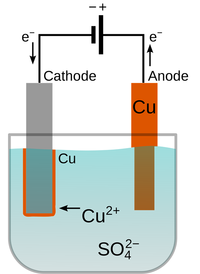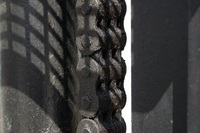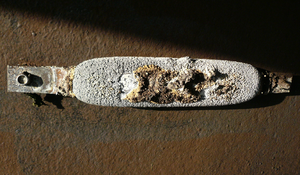Difference between revisions of "Corrosion"
(→Preventing and Reducing Corrosion) |
|||
| Line 25: | Line 25: | ||
|- | |- | ||
| style="height:20px; width:200px; text-align:center;" |The [[corrosion]] of [[Iron]] forms brown [[Iron Oxide]], known as [[Rusting|rust]]. [[Rusting]] happens more quickly in humid air or in [[Brine|salty water]]. | | style="height:20px; width:200px; text-align:center;" |The [[corrosion]] of [[Iron]] forms brown [[Iron Oxide]], known as [[Rusting|rust]]. [[Rusting]] happens more quickly in humid air or in [[Brine|salty water]]. | ||
| − | | style="height:20px; width:200px; text-align:center;" |The [[corrosion]] of [[Copper]] forms green [[Copper Carbonate]]. Initially the [[Copper]] is [[Oxidised]] to form [[Copper Oxide]], a black [[solid]], but then [[Chemical Reaction|reacts]] with | + | | style="height:20px; width:200px; text-align:center;" |The [[corrosion]] of [[Copper]] forms green [[Copper Carbonate]]. Initially the [[Copper]] is [[Oxidised]] to form [[Copper Oxide]], a black [[solid]], but then [[Chemical Reaction|reacts]] with Carbonic Acid to form [[Copper Carbonate]]. |
| style="height:20px; width:200px; text-align:center;" |This statue is made of [[Limestone]] which is mostly [[Calcium Carbonate]]. It is '''corroded''' by [[Acid Rain]] to form [[soluble]] [[salt]]s which wash away. | | style="height:20px; width:200px; text-align:center;" |This statue is made of [[Limestone]] which is mostly [[Calcium Carbonate]]. It is '''corroded''' by [[Acid Rain]] to form [[soluble]] [[salt]]s which wash away. | ||
|} | |} | ||
Revision as of 14:03, 3 April 2019
Contents
Key Stage 3
Meaning
Corrosion is when a material is worn down by chemical reactions with substances in the environment.
About Corrosion
- Rusting is a form of corrosion.
- Acid rain causes the corrosion of limestone and marble buildings and statues.
Key Stage 4
Meaning
Corrosion is when a material is worn down by chemical reactions with substances in the environment.
About Corrosion
- Corrosion is commonly caused by Water, Oxygen and Acids in the environment.
- Metals and stone (such as limestone, marble and chalk) are the most commonly corroded materials.
- More reactive metals are more easily corroded.
Examples
| The corrosion of Iron forms brown Iron Oxide, known as rust. Rusting happens more quickly in humid air or in salty water. | The corrosion of Copper forms green Copper Carbonate. Initially the Copper is Oxidised to form Copper Oxide, a black solid, but then reacts with Carbonic Acid to form Copper Carbonate. | This statue is made of Limestone which is mostly Calcium Carbonate. It is corroded by Acid Rain to form soluble salts which wash away. |
Preventing and Reducing Corrosion
- Corrosion can be prevented by making a physical barrier between the object and the chemicals in the environment. This can be done by painting, covering something in grease or by electroplating.
| This Iron pipe was painted to prevent corrosion, but where the paint has chipped away, the Iron has rusted. | Electroplating can cover a reactive metal with a less reactive metal such as Copper create a physical barrier between the object and the environment. | Grease is used on bike chains to prevent corrosion. Paint and electroplating cannot be used because they would chip away from constant movement of the chain. |
- Corrosion of a metal object can also be prevented using a Sacrificial Anode which is a metal more reactive metal placed in electrical contact with the object. This prevents Oxidation of the object because the more reactive metal has a greater tendency to form positive ions causing it to oxidise instead of the object.
| A Sacrificial Anode made of Zinc has been attached to the Iron hull of a boat. |
